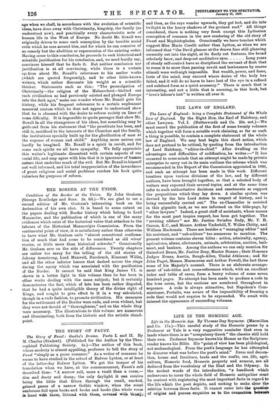THE STORY OF FAUST.
The Story of Faust : Goethe's Drama. Parts L and II. By )d. Charles (Student). (Published for the Author by the Theo- sophical Publishing Society. 5s.)—The author of this book, whose modesty is almost appalling, professes to tell the story of Faust "simply as a prose romance." As a writer of romance he seems to have studied in the school of Bulwer Lytton, or at least of the latter-day Bulwer Lytton. We get the temper of his translation when we have, at the commencement, Faust's cell described thus : "A narrow cell, more a vault than a room,— dim and dusty and damp ; the only daylight it can receive being the little that filters through the small„ smoked, grimed panes of a narrow Gothic window, when the scant sunbeams fall upon books and books and books (the whole room is hued with them, littered, with them, covered wi9A t4Lcual; and then, as the rays wander upwards, they get lost, and die into twilight in the heavy shadows of the groined roof." An things considered, there is nothing very fresh except this Lyttonian conception of romance in the new rendering of the old story of Faust and Mephistopheles. Occasionally we have touches whisk suggest Miss Marie Corelli rather than Lytton, as when we are informed that "the Devil glances at the drawn face still glancing earnestly out into the night, at its finely cut features, the broad
scholarly brow, and deep-set meditative eyes Long years of steady self-control have so disciplined the servant of flesh that to rouse it to more than passing revolt and lawlessness by coarse stimuli were well-nigh impossible. But wealth, power, and fame, lusts of the mind, may succeed where desire of the body has failed, and it will do no harm to have lust of the eye in a refined and subdued form as a quiet accessory." There is much that is interesting, and not a little that is amusing, in this book, but "love's labour's lost" is written all over it.




















































 Previous page
Previous page